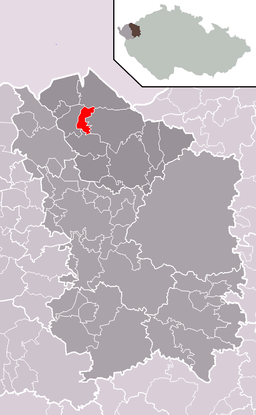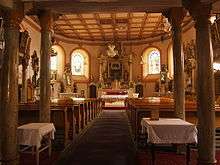Abertamy
| Abertamy | |||
| Town | |||
 | |||
|
|||
| Country | Czech Republic | ||
|---|---|---|---|
| Region | Karlovy Vary | ||
| District | Karlovy Vary | ||
| Commune | Ostrov | ||
| Elevation | 900 m (2,953 ft) | ||
| Coordinates | CZ 50°22′8″N 12°49′6″E / 50.36889°N 12.81833°ECoordinates: CZ 50°22′8″N 12°49′6″E / 50.36889°N 12.81833°E | ||
| Area | 8.70 km2 (3.36 sq mi) | ||
| Population | 1,323 (2011) | ||
| Density | 152/km2 (394/sq mi) | ||
| First mentioned | 1529 | ||
| Mayor | Zdeněk Lakatoš | ||
| Timezone | CET (UTC+1) | ||
| - summer (DST) | CEST (UTC+2) | ||
| Postal code | 362 35 | ||
  Location in the Czech Republic
| |||
 Location in Karlovy Vary District
| |||
| Wikimedia Commons: Abertamy | |||
| Statistics: statnisprava.cz | |||
| Website: www | |||
Abertamy (in German Abertham) is a town in the Karlovy Vary Region of the Czech Republic. It is located in Ore Mountains about 16 km (10 mi) north of Karlovy Vary and has a population of 1,413 (2005). With an altitude of 840 meters above sea level, the place serves as a winter sports center. From 1938 to 1945 it was one of the municipalities in Sudetenland.
The village of Hřebečná is the administrative part of Abertamy.
History

Abertamy is first mentioned in written documents from 1529, when miners started to settle in the area. During 1531-1558 silver was mined here. In 1579 Abertamy obtained township rights. On September 15, 1590, a strong earthquake was recorded here. After the Thirty Years' War silver mining stopped, and only the mining of tin continued. Abertamy lost its town rights, and the area was forcibly recatholicized after the war. During the 19th century manufacturing of gloves began and expanded in the 20th century. In 1876 Abertamy again obtained town status.
In 1910 the town had 4,200 inhabitants. In 1921 Abertamy was electrified. It was annexed into the Third Reich in 1938; in 1945 many German speaking people were expelled and local industry was nationalised. However roughly 150,000 of 3.5 million Sudeten Germans in the surrounding region were not expelled due to their indespensable mining and technical skills. Even by 1960 most children entering grade 1 in Abertamy only spoke German and until the end of communism the town was largely German speaking.[1] In 1947 Abertamy had about 1,200 inhabitants. Intensive mining of uranium ore had started (and prisoners from nearby communist Jáchymov concentration camp were forced to work there under cruel conditions). In 1998 the factory producing gloves closed down.
Since 1946, Abertamy has had a secondary school specialising in forest industry[2]

Attractions
- Near the town is the 1028 meter-high mountain Plešivec. The area is actively used for winter and summer sports, with many tourists coming from nearby Germany.
- A church building from 1534, current baroque style from 1736, renovated in the first half of 19th century. The building was renovated again in the 1990s and in 2003.
- A large formation of rocks known as Dračí skály (Dragon's rocks)[3]
Famous people associated with Abertamy
- Josef Porkert (1829–1895), manufacturer of pianos
- Horst Siegl (1969), a football player
References
External links
-
 Media related to Abertamy at Wikimedia Commons
Media related to Abertamy at Wikimedia Commons - Municipality website (Czech)
- Unofficial website (Czech)


